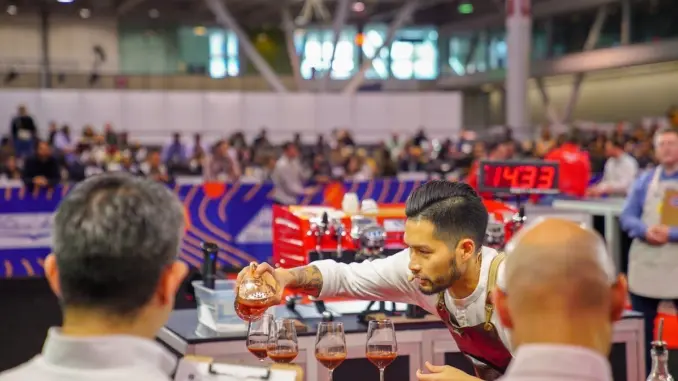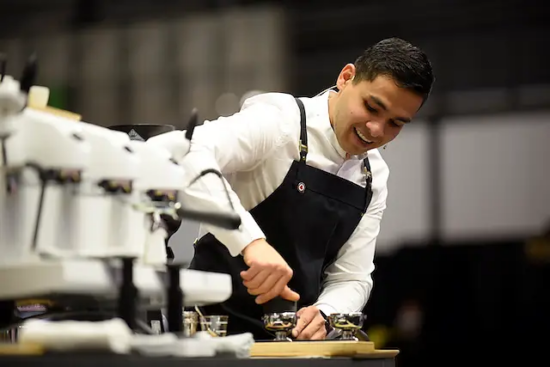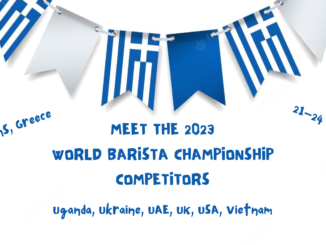
We explore the rule change that will allow plant-based and other animals’ milks at the WBC, starting at the 2023 competition in Athens, Greece, this summer.
BY CHRIS RYAN
BARISTA MAGAZINE ONLINE
Featured photo by Lanny Huang for World Coffee Events
Next week, while the global specialty-coffee industry is gathering at the 2023 Specialty Coffee Expo in Portland, Ore., one corner of the show will be devoted to the U.S. Coffee Championships (USCC). Six national competitions will take place at the USCC in Portland, including the U.S. Barista Championship, where baristas will vie for the chance to compete at the World Barista Championship (WBC) this June in Athens, Greece.
When the WBC does get underway this summer, it will make a few new waves, courtesy of updated rules and regulations announced by the Specialty Coffee Association (SCA) in late 2022. Perhaps the biggest change, per the announcement from SCA: “The milk beverage course can now be prepared using plant-based or other animals’ milk. … Plain (sweetened or unsweetened) plant-based milks may be used. Animal milks are not restricted to cow’s milk.”

Incorporating a Growing Trend
That’s right: For the first time since the WBC’s start in 2000, competitors will be able to serve their milk beverage without the requirement of using cow’s milk. The change comes at a time when plant-based milks are continuing to increase in popularity. According to a 2022 report from Strategic Market Research, the global market for plant-based milks was valued at $35 billion USD in 2021 and is expected to surpass $123 billion USD by 2030, a 15% compound annual growth rate.
“There has been a move in consumption away from dairy to plant-based milks for many years, both for home use and in cafés,” says Deb Kaminiski, director of foodservice marketing for Pacific Foods, maker of the Barista Series line of plant-based beverages, and the title sponsor of the 2023 USCC. “In the competitions, plant-based milks will give competitors additional creative options.”
Pandemic Delay
Amy Ball, events officer for SCA, says the change has been in the works for some time. The SCA formed its current Competitions Strategic Committee structure in 2017 and soon began discussing rule changes, including the allowance of nondairy milks. She says the plans to allow plant-based milks at the WBC were created in 2019 and planned for implementation in 2021, but the COVID-19 pandemic pushed back the rule change until the 2023 WBC. The first Plant-Based Beverage Sponsor for the WBC is Alpro, which earned the honor following an open-bidding process lead by the SCA partnership team. “Alpro has been a long-time supporter of the SCA and the World Coffee Championships, and we are excited to have their support for the 2023 event in Athens, Greece,” says Amy.

Additional Flexibility for Competitors
The allowance of plant-based milks will allow competitors to stay on-trend but will likely give them more flexibility in their routines, too. “The rule to include plant-based (and other) milks is part of a larger goal to open up the courses within the competition and give the barista more flexibility to highlight the coffee in the way that they chose,” Amy says. “…The committee is excited to see how the competition will expand and evolve, and how competitors will continue to evolve showcasing the coffees that are brought to the world stage.”
While we’ll have to wait until June to see how competitors implement the rule change, recent barista champions think the addition of nondairy milks will bring an exciting new wrinkle to the WBC. “I think it’s drastically opened up a wide range of potential ways barista competitors can express their coffee through milk,” says Anthony Douglas of Axil Coffee Roasters in Melbourne, Australia, the 2022 World Barista Champion. “It will allow competitors much more control in tailoring the experience of the milk beverage, selecting a milk profile that best suits, complements, and showcases the qualities in their coffee.”
Understanding Market Changes
Adds Diego Campos, the 2021 World Barista Champion, of Colombia, “Taking into account that the WBC is a competition focused mainly on the consumption of specialty coffee and we want the industry in the world to understand the importance of good coffee consumption, we have to be willing to implement what the market or people want to try. In this case, it’s different types of milk, allowing us to reach many more people and make them drink coffee in a different way that is viable for them to consume.”
Both competitors say they would have experimented with nondairy milks in their routine had the option been available to them. “I think that if this possibility had existed in my competitions, and if it depended on winning the competition or showing a differential point in front of other consumers, I would not have hesitated to try it,” Diego says. Adds Anthony, “If the rule had existed whilst I was competing, I would have approached the competition the same way I always have, testing every variable and milk variety I possibly could, to make sure I was serving the highest-scoring drinks possible.”

What’s in Store for Other Competitions?
Nondairy milks will make their WBC debut in Athens this June, but it will be a bit longer until they’re allowed in competing countries’ national competitions. Joshua Edens, the vice chair of the United States Barista Competitions Committee and a member of the World Coffee Events Competitions Strategic Committee (CSC), says the CSC has asked national competition bodies to wait on adopting this year’s rules changes (including the addition of nondairy milks) until it can prepare support to help in their implementation. Says Joshua, “This looks like, in some ways, developing new calibration workshop materials and working with current WCE reps on aiding their competition bodies in these changes.”
Joshua continues, “The timeline for when these materials will be available and when they will trickle down to our USBC Judges Group is still to be determined. In order for us to best adopt new rules, we need to be able to be as calibrated to the WBC standard as possible and fully understand how to apply them in our own competition body. This helps best prepare our judges to support our competitors and ultimately our champion at WBC.”
For more on the World Barista Championship, head here.
Bonus nugget: In a funny bit of timing, a new movie called Coffee Wars, scheduled for release this year, tells the story of a café owner who vies to win the World Barista Championship. She hopes to save her struggling café that only serves plant-based milks with the competition’s prize of 50,000 euros. (The real WBC does not have a cash prize.) Check out the trailer here.



